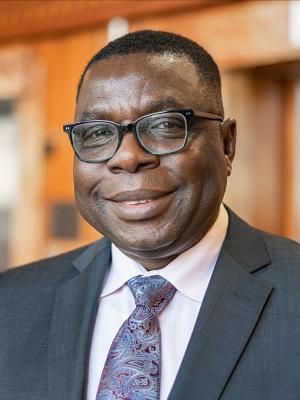
A University of Utah Health researcher has been recognized for his work on developing interventions to address tobacco-related health disparities among racial and ethnic minorities (specifically Blacks and African Americans) as well as other underserved communities, including homeless populations.
Kolawole S. Okuyemi, M.D., M.P.H., professor and chair of the Department of Family & Preventive Medicine, was recently honored with the inaugural Pebbles Fagan Health Equity Award. The prize is named in honor of Pebbles Fagan, Ph.D., M.P.H. and recognizes members of the Society for Research on Nicotine and Tobacco who have made outstanding contributions to public health and minority communities through health equity research.
Okuyemi said that for many years research studies into nicotine and tobacco use did not include many from marginalized populations because they didn’t smoke as much as Whites. To qualify for inclusion, participants needed to consume 20 or more cigarettes per day. However, Blacks typically averaged roughly half that amount.
Despite the lower levels of use, though, “we found that for Blacks, addiction happened at a lower level of smoking compared to Whites,” Okuyemi said.
This unintentional bias ensured that the final data compiled from early research was not representative of the broader cigarette smoking population. However, in his research, Okuyemi employed an approach he called “community engaged research in health inequity.”
“That means you engage communities as credible partners and you treat them with respect,” he explained. “They have a voice at the table. They actually help you develop and refine the interventions to ensure it aligns with the (subject community’s) needs and culture.”
That progressive approach invited greater participation from minority populations, specifically Blacks, which resulted in more accurate and inclusive reporting. The research indicated that for some communities smoking less could still have significant impacts on individuals’ health outcomes, he said.
“Even after smoking fewer cigarettes a day, Blacks suffered from about the same or even worse tobacco related disease like lung cancer, heart disease, emphysema, and (chronic obstructive pulmonary disease) COPD,” Okuyemi noted. “Those are diseases that are disproportionally higher among Blacks.”
He said that another major lesson from the research results is that the notion that minority communities are not interested in research studies is a myth. “What the community wants is a conversation—a collaboration,” he said. “They want research that is conducted with them rather than research on them.”
Okuyemi also conducted pioneering work researching nicotine and tobacco use among homeless populations. This work revealed that individuals who identified as homeless were eager to participate as subjects as well as research assistants charged with helping enroll new participants. Prior to his efforts, previous tobacco use research have excluded smokers experiencing homelessness.
“It takes a different level of commitment, perspective, and persistence to do this work—and it’s a lot easier to address health equities when it’s diabetes rather than smoking that you’re studying,” Okuyemi said. “But because we haven’t targeted this research before, many people have been left behind.”
Regarding the award, Okuyemi said he is gratified to know his peers appreciate and respect the research he has been doing all these years.
“There are populations who suffer more from tobacco use than the rest of the groups we’ve focused on,” he said. “That's why the health equity award was created, and I feel so honored to be the first person to receive the award because it tells me the organization believes this is important work.”
